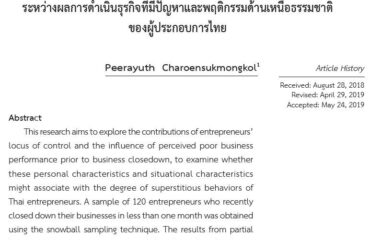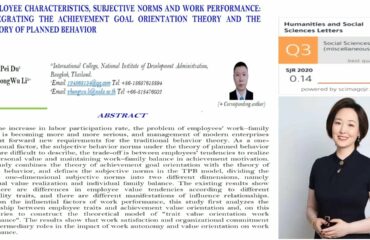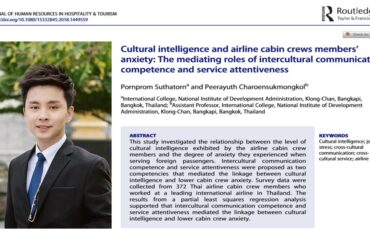Expatriates assigned by multinational enterprises (MNEs) to manage subsidiaries in foreign countries often play a critical role in determining the MNEs’ global performance. However, cultural differences between the expatriate’s home and host countries can make it difficult for them to work effectively with local employees. Therefore, expatriates must possess cross-cultural competence to increase their effectiveness in working with foreign employees and managing subsidiaries in their host country.
The evidence about this role of cross-cultural competence has been documented in the recent research by the faculty of ICO NIDA, Assoc. Prof. Dr. Peerayuth Charoensukmongkol, which is published in the “Scopus Top 6 percentile journal (Scimago Quartile 1)”. In particular, his research proposes that one characteristic that determines expatriates’ ability to effectively handle international assignments is cultural intelligence (CQ). His research collected survey data from 201 dyads of Chinese expatriates and Thai employees at the subsidiaries of Chinese multinational enterprises in Thailand. His results indicate that CQ facilitates the Chinese expatriates to understand Thai employees’ cultural characteristics and help them make appropriate cultural adaptations accordingly. This could lead the Thai employees to have a favorable attitude toward the Chinese expatriates and view them as benevolent supervisors, thereby encouraging the Thai employees to develop close interpersonal relationship with the Chinese expatriates.
For the recommendation for MNEs, his research suggests that the selection of the expatriates for the international assignment may need to be based on their level of cross-cultural competence. Alternatively, MNEs could offer extensive cross-cultural training to their prospective expatriates. These recommendations can help expatriates develop a strong understanding of the cultures of local employees in the host country, thereby promoting the opportunity to establish a trusting relationship with local employees and enhance their effectiveness in cross-cultural management
Source:
Charoensukmongkol, P. (2021), How Chinese Expatriates’ Cultural Intelligence Promotes Supervisor-Subordinate Guanxi with Thai Employees: The Mediating Effect of Expatriates’ Benevolence, International Journal of Cross Cultural Management, 21(1), 9-30. https://doi.org/10.1177/1470595821996735





